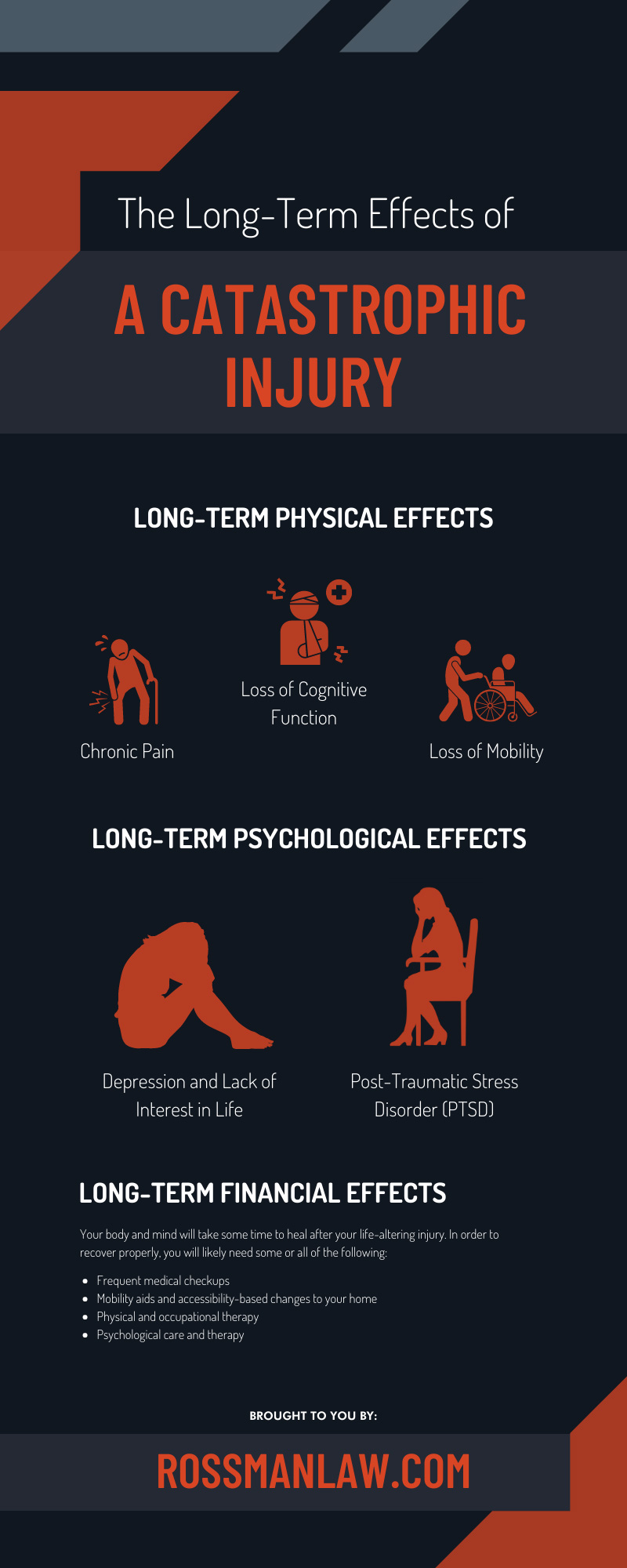
5 Things You Need To Know About Defective Tire Claims
May 26, 2023
Can Athletes Sue for Sports-Related Personal Injury?
June 13, 2023Catastrophic injuries can have effects that last long after your body has healed. Your finances, your day-to-day activities, and your psychological health may take some time to return to normal—if they do at all. There’s a chance your life may never return to exactly what it was like before you experienced your injury.
Don’t let this information cause worry, though. Some long-term effects of a catastrophic injury may last longer than others, but you have plenty of supportive parties at your disposal to help you rebuild your life. If your life-altering injury was caused by the negligence of another person, the attorneys at Rossman Law Group can help you secure full and fair compensation.
Common Types of Catastrophic Injuries
All bodily injuries cause some level of pain and discomfort, but a catastrophic injury is generally one that causes a permanent disability or change in the individual’s standard of living. There is no set legal definition of catastrophic injury; it all depends on the unique circumstances surrounding your case. Some examples of catastrophic injuries include, but are certainly not limited to:
- Traumatic brain injuries (TBIs)
- Limb amputations
- Severe burns
- Spinal cord injuries
After suffering an injury of this severity, you may need to take several weeks or months off work to recover. You may also find that you need assistance with daily tasks that you were previously able to perform yourself.
Getting used to life after a catastrophic injury takes time and money. If your injury was caused by somebody else’s negligent actions, you may be able to file a lawsuit to receive compensation.
Long-Term Physical Effects
Depending on the type of injury you experience, you may have a long-term or permanent physical disability. What effects can you expect as you recover from your injury?
Chronic Pain
If you suffered a spinal injury or severe burns, your body may be in a great deal of pain as you heal. Some individuals who have limbs amputated report phantom pains in their missing limbs that are difficult to ignore. Your doctor may prescribe painkillers to help you heal in more comfort; make sure you take those painkillers only as prescribed.
Loss of Mobility
Some individuals who are catastrophically injured experience temporary or permanent loss of mobility. Spinal cord injuries are common causes of permanent paralysis that requires the use of a wheelchair. If you’re healing from second- or third-degree burns, your muscles may atrophy from lack of use.
Loss of Cognitive Function
Did you suffer a blow to the head as part of your catastrophic injury? If your medical team found that you received a traumatic brain injury, you may experience some of the following effects:
- Difficulty understanding and processing new information
- Loss of fine motor control
- Behavior that is socially unacceptable or uncharacteristic of your personality
- Trouble organizing your thoughts
As you recover from your injury, take care not to recede into isolation. Stay in regular contact with your loved ones; they may pick up on symptoms that you wouldn’t recognize in yourself. If your personality has undergone a marked change since your injury, make an appointment with a neurologist at your earliest convenience.
Long-Term Psychological Effects
Don’t neglect your mental health as you recover from your physical injury. The experience of a catastrophic injury will likely stick with you for a long time, so keep an eye out for psychological symptoms of distress.
Depression and Lack of Interest in Life
In the weeks and months following your injury, you may be cooped up at home with limits on the things you can do. Lying in bed for weeks on end can lead to a loss of interest in the world around you, and coming to terms with your injury can trigger depression.
If you use a wheelchair or other mobility aid as a result of your injury, you might struggle to adjust to your newfound physical limitations. Depression is a common side effect of catastrophic injuries, as sufferers often feel hopeless and incapable of fully healing.
Post-Traumatic Stress Disorder (PTSD)
Perhaps one of the most common aftereffects of a catastrophic injury is the development of PTSD. It’s an anxiety-based disorder often found in people who have undergone a life-altering traumatic event. Do any of the following symptoms sound familiar to you?
- Nightmares about reliving your injury
- Frequent bouts of crying for no apparent reason
- Intrusive thoughts and detailed flashbacks to your injury
- Reckless or self-destructive behavior
- Avoidance of situations that remind you of your injury
- Persistent feelings of guilt and shame
If these symptoms last for more than a month and cause significant interferences with your daily life, seek help by talking to a psychiatrist or counselor.
Are you considering suing the party or parties responsible for your injury? Hold on to all of your PTSD-related medical bills; your catastrophic injury attorney can use them as evidence of your financial stress and your emotional suffering.
Long-Term Financial Effects
Your body and mind will take some time to heal after your life-altering injury. In order to recover properly, you will likely need some or all of the following:
- Frequent medical checkups
- Mobility aids and accessibility-based changes to your home
- Physical and occupational therapy
- Psychological care and therapy
As you’ve probably realized by now, getting your life back after a catastrophic injury costs a great deal of money—money you may not have if you’re not working.
Hold on to all of your medical bills, even if looking at them stresses you out. Should you choose to sue the party responsible for your injury, your attorney will use those bills to prove the severity of your injury. Once you and your lawyer get to the settlement stage, medical bills will also be factored into that amount; you should not have to pay for someone else’s negligence.
If you have recently experienced a life-changing catastrophic injury, you have a long road to recovery ahead of you. Luckily, you are not alone; you have emotional, medical, and legal support systems available to help you deal with the long-term effects of your catastrophic injury.
Was your injury directly caused by the negligent actions of another person or group of people? Contact Rossman Law Group for a free consultation and tell us your story in full. Our team of catastrophic injury lawyers will listen with compassion, and we’ll offer reliable legal advice that can help you move forward.






